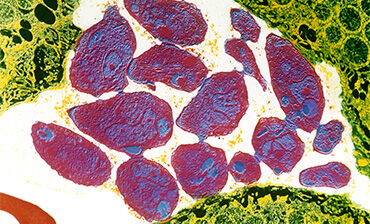Toxoplasmosis

Toxoplasmosis is an infection caused by the parasite Toxoplasma gondii. Cats are the reservoir of the parasite. They excrete cysts in the environment, able to infect many other animals, and humans can become infected either by ingesting the cysts (by direct contact with cats or through food or water contaminated by cat faeces), or by eating poorly cooked meat containing cysts, especially pork and mutton.
Usually toxoplasmosis goes with no symptoms in humans (and animals), but healthy individuals may experience swollen lymph glands. However, it may also cause life-threatening disease in individuals with impaired immune defence. During pregnancy the infection can affect the foetus.
Pregnant women, also without symptoms, may transmit the infection to the foetus, which can result in abortion, still-birth, perinatal death (due to disseminated toxoplasmosis), or congenital infection with severe malformation affecting the eyes and the brain. Infection in individuals with impaired immunity tends to seriously affect the central nervous system, but also other organs may be affected. Such patients may require prolonged (sometimes life-long) therapy.
The Toxoplasma cysts can survive in the environment for a long time, contaminating fruit and vegetables, and cysts in meat remain infective as long as the meat is edible.



